June 26th, 2011 § § permalink
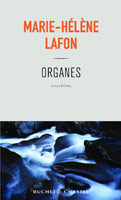
A few posts ago I mentioned French short story writer Marie Lafon, who won the Prix Renaissance for her 2002 collection Liturgie. This fall, West Branch, the literary journal of Bucknell University, will be featuring my translation of her story “Moles” from her collection Organes, also published by Buchet-Chastel.
Starting with Issue #3, I’ll also be jumping on as translator for BOOM! Studios’ Star Wars parody Space Warped by Hervé Bourhis and Rudy Spiessert, in their kaboom! imprint. It’s a fun, quippy ride, set in vaguely medieval times.
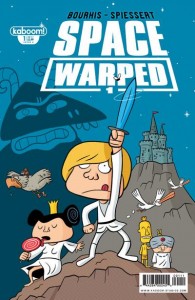
June 25th, 2011 § § permalink
on one side of which was a huge building with a domed roof. Light streamed from it through a great window of stained glass, on which was depicted a blue warrior fighting a red dragon… no, it was not a stained glass window but merely the reflection on the white walls of the building from a house in complete darkness in the opposite side of the square, inhabited by creatures made of red lacquer. He new that they were expecting him to call, because they believed that he was courting one of them.” ~ Hope Mirrlees, Lud-in-the-Mist
June 24th, 2011 § § permalink
cool stuff. Check it out:
- Huge congrats to my Clarion 2009 pal Shauna Roberts for winning the Older Writers Grant this year from the Speculative Literature Foundation! In her daily life, Shauna is an award-winning medical writer and editor specializing in diabetes and related subjects, but I know her best as a penner of fantasy, science fiction, and romance stories and novels.
- Writer, filmmaker, and book scout D.W. Gibson, director of the Ledig House residency, has launched an exciting documentary project called Not Working. It’s not what it sounds like. This is what it is:
Beginning on June 21, Gibson will spend the summer and early fall travelling across the US, beginning in Orange County, California, ï¬nishing in Camden, New Jersey. Accompanied by a videographer, he will interview individuals who have become unemployed as a result of the economic downturn over the last three years. Interviews will center on each personʼs story of losing a job: the Friday visit to HR, the form letter, the pointed email, the profane text, the security escort. Gibson will visit epicenters of the recession such as Fresno, California; Reno, Nevada; Kansas City, Missouri; and Columbus, Ohio.
The project is a response to Stud Terkelʼs seminal book Working, ï¬rst published in 1972. Familiarity with Terkelʼs book will absolutely enhance oneʼs interest in this project, but it is by no means a prerequisite. Not Working communicates on its own. By presenting the voices and faces of those affected, it reveals the Great American Recession not just as a set of statistics or a political debating point but as an intensely human tragedy that is sweeping the country. Not Working will be published as a book in the early spring of 2012 by OR Books.
Check out the site for pics, vids, podcasts, and blog updates!
June 19th, 2011 § § permalink
Basically, I was like, “Holy Sh**!” when I came home from dinner last night and found my Clarion buds announcing on Facebook that Georges-Olivier Châteaureynaud’s A Life on Paper won the first ever Science Fiction & Fantasy Translation Award!
Huge congratulations to the Honorable Mentions, and all the Nominees!
Long Form Honorable Mention
The Golden Age, Michal Ajvaz, translated by Andrew Oakland (Dalkey Archive Press). Original publication in Czech as Zlatý Věk (2001).
Long Form Winner
A Life on Paper: Stories, Georges-Olivier Châteaureynaud, translated by Edward Gauvin (Small Beer Press). Original publication in French (1976Â-2005).
Short Form Honorable Mention
“Wagtailâ€, Marketta Niemelä, translated by Liisa Rantalaiho (Usva International 2010, ed. Anne Leinonen). Original publication in Finnish as “Västäräkki†(Usva (The Mist), 2008).
Short Form Winner
“Elegy for a Young Elkâ€, Hannu Rajaniemi, translated by Hannu Rajaniemi (Subterranean Online, Spring 2010). Original publication in Finnish (Portti, 2007).
Special Award
In addition to the standard awards, the Board of ARESFFT presented a special award to British author and translator Brian Stableford in recognition of the excellence of his translation work.
June 17th, 2011 § § permalink
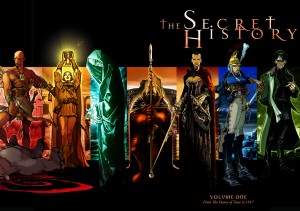
I’ve been translating the comics series The Secret History for Archaia since around 2006. I’ve always liked its blend of history and action, and I suppose that over the years it became a favorite because it felt like an underdog, overlooked in favor of Archaia’s more popular French series, The Killer and Okko. Former history professor turned comics scribe Jean-Pierre Pécau worked with a number of artists over its run, including Leo Pilipovic and Goran Sudzuka, but after a stint at the beginning, the series seems to have settled on Igor Kordey, perhaps best known in the US for his time on the Grant Morrison X-Men run.
All this to say I’m delighted to see The Secret History nominated in the category of Favorite European Comic Book for The Eagle Awards, a British-based fan awards program whose legacy stretches back to the middle 1970s. 2011 winners were announced in late May at the MCM Expo in London. Heck, I didn’t even know The Secret History was distributed in the UK! It lost to Blacksad, another book I briefly worked on, and was surrounded by worthy competitors: Sky Doll, Requiem: Vampire Knight, and, The Scorpion.
I’m also happy to announce that Archaia has taken on two Pécau titles set in the Secret History universe. I can’t reveal the names of these spin-off series yet, but it seems only fitting, since Archaia has also released the Cyclops series by Killer writer Matz (and Luc Jacamon, before it switches to another artist). Currently, I’m working on Book 18 of The Secret History, which in France is up to a whopping 21 volumes. Go buy the latest book! Keep it alive in the States!
June 16th, 2011 § § permalink
Tuesday evening, the U.S. Embassy in Brussels (Rue Zinner 2) hosted the farewell reception for this year’s Fulbrighters. The year’s gone by so fast! I thought I’d indulge some nostalgia with these photos from September’s welcome reception, from a post that never happened last fall. In a room with refreshingly Audobon wallpaper, Ambassador Howard Gutman effused and enthused by way of congratulations while the trays of shrimp, of magret, of gazpacho made their discreet and eagerly met rounds. Cellist Lauren Franklin treated us to some Bach.
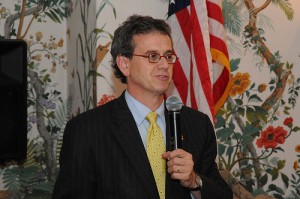
Ambassador Howard Gutman
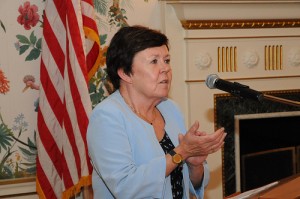
Fulbright Director Margaret Nicholson
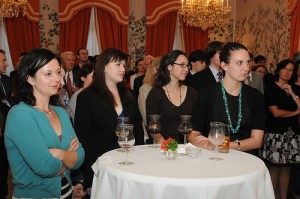
Fulbrighters!
June 15th, 2011 § § permalink
Two new translation publications, enhanced by streaming audio. Listen up!
- At Liquid Imagination, Georges-Olivier Châteaureynaud’s “Paradiso,” a previously unpublished story from his 1976 collection La belle charbonnière [The Beautiful Coalwoman], from which several stories in A Life on Paper are drawn. Richly read by the erstwhile Bob Eccles. This ninth issue of Liquid Imagination continues the magazine’s tradition of featuring top notch science fiction, fantasy, and horror.
- Anomalous, the new initiative of translator-poetess Erica Mena, now in its second issue, features four short-shorts by Marcel Béalu. That’s one more than last summer in Joyland! Summer seems to bring the return of this secret master of French fabulism, though the pieces, in text with audio narrated by yours truly, aren’t up quite yet. Content for this second issue will be released on a rolling basis: every two weeks, a small batch of poetry, fiction, nonfiction, or translation, pairing complementary pieces. However, the issue is already available in its entirety, PDF and MP3 downloadable for free on the website. That is, they are staggering the content’s release–a great idea, given the 112 page magazine’s staggering content. Brandon Holmquest debuts the issue with his prose poem “Cielito Lindo†embedding the image of a maze. Editor Mena will also be teaching Châteaureynaud’s A Life on Paper in her Translation as Art class for the UMass Boston Summer Honors Program.
I leave you with this image of the late Marcel Béalu’s bookstore Le Pont Traversé in Paris, near the Jardin du Luxembourg, taken by Giorgio “sunsetwaves” Restelli:
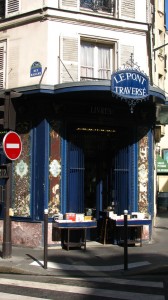
June 7th, 2011 § § permalink
these fine periodical products which feature the fiction of Nicole M. Taylor and H.V. Chao.
The Dark Highlands Anthology is a literary and art journal, published in April and October of each year, that showcases regional writers specializing in horror, the supernatural, dark science fiction and fantasy.
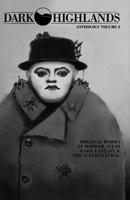
“Terror arrives in all forms” in this second volume. “People go missing. Zombies roam the land. Visitors arrive from the sky. Ghosts lurk around every corner. Nothing is what it seems.” But this much is certain: you will be able to read Nicole Taylor’s “Specter” there, her second story to appear in print! And you will not be sorry.
The erstwhile Portlander Douglas Lain–writer, editor, and revolutionary–has released what is sadly the final print issue of his zine Diet Soap, which will now exist only as a podcast on all things speculative and Situationist. Issue #4, available on Lulu as a a dollar download or a seven buck paperback, takes slavery as its theme and features H.V. Chao’s “The Interview,” first published in Spring 2009 on the Diet Soap website.
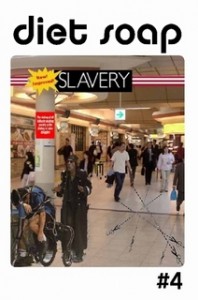
June 6th, 2011 § § permalink
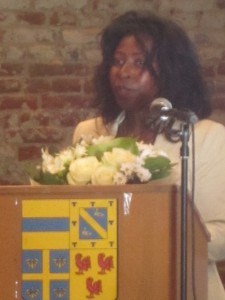
A few weekends ago (May 21), Nicole and I went to the pleasant town of Ottignies for the Prix Renaissance de la Nouvelle. Now in its 20th year, this short story prize, sponsored by the French Community of Belgium, is awarded annually to a single collection in French. It has honored a variety of writers from over 17 different publishers, including such noted French doyennes of the form as Annie Saumont, Linda Le, Marie-Hélène Lafon, and Véronique Bizot, as well as Belgians Vincent Engel and Georges Thinès.
We were there at the invitation of Michel Lambert, the founder of the prize, and a close friend of Georges-Olivier Châteaureynaud, who has served on the prize jury since its inception. Lambert, himself a noted short story writer in the classical realist tradition, is also the editor of Le Carnet et Les Instants, the official magazine of the Belgian French Community’s Service for the Promotion of Letters.
While short story writers everywhere are wont to grumble about being practitioners of a beleaguered, unloved form, Francophone writers have particular cause for complaint in comparison with their American counterparts, who benefit from a much more extensive support network in academia. There is no equivalent in France (or Belgium for that matter) for the infrastructure American universities provide short story culture: a haven and last bastion of surprising vitality. However under-read and underfunded, journals and reviews provide a constant showcase for stories, for which periodical publication opportunities in France are far more infrequent. It’s possible that, as Chad Harbach argues in Slate and n+1, the MFA’s institutionalization made the short story a “primary pedagogical form”; whatever the cause, the form’s now de rigueur inclusion on the syllabi of not only creative writing but literature courses increases its general exposure, effectively gracing it with the fickle immortality of canon.
And so, to draw attention to their craft in Francophonia, short story writers band together to found prizes like this one, which will hopefully bring about the renaissance of its name. As Châteaureynaud put it to me, “Novelists are all in constant competition with each other. There’s isn’t the same sense among short story writers… they know they’re few and far between, so they lend each other helping hands, and form a kind of mafia.” I noted, among the past winners, Sylvain Jouty and Hubert Haddad, two members of La Nouvelle Fiction (The New Fiction, or Neofiction), a literary movement Châteaureynaud helped found: “New” because it rose up against the prevailingly minimalist and confessional tendencies of contemporary French writing, seeking to rouse it from “the slumber of psychological realism,” and to restore myth, fable, and fairy tale to a place of primacy.
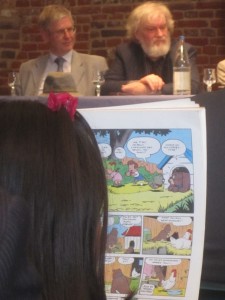
The prize ceremony was held at the Ferme du Douaire, a former country farm now a bit at sea between the main thoroughfare through town and the parking lot of a supermarket-anchored strip mall, though in the sandy, intact courtyard of the farm these modern neighbors faded away. One of the stone barns housed the municipal library and, the one beside it was the auditorium where we sat, staring up occasionally at the dark, aged rafters with their steel braces. This year’s winner was Scholastique Mukasonga, for her collection L’Iguifou: nouvelles rwandaises, published by Gallimard’s “Dark Continent” imprint (a name that, unfortunately, translates rather poorly). The author of two previous novels, the Rwandan Mukasonga now lives in Normandy. Her collection takes its title from the Rwandan word “igifu,” which refers to insatiable hunger. The author read from these harrowing tales of the genocide, and related her long path to becoming not only a writer, but one who could write unflinchingly about such matters.
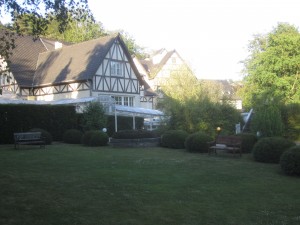
Later, we all retired to the Château de Limelette, a a nearby hotel-restaurant in a verdant, rustic setting. The extensive landscaped property looked like a popular wedding spot. At the end of the banquet, a cake was brought out for the happy winner, to celebrate the 20th anniversary of the prize.
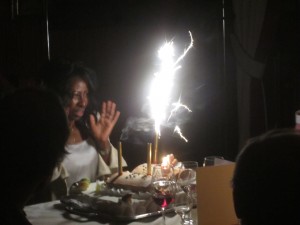
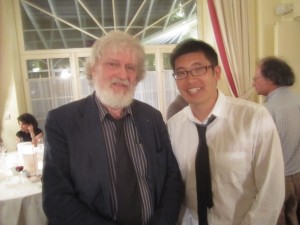
Ottignies-Louvain-la-Neuve













